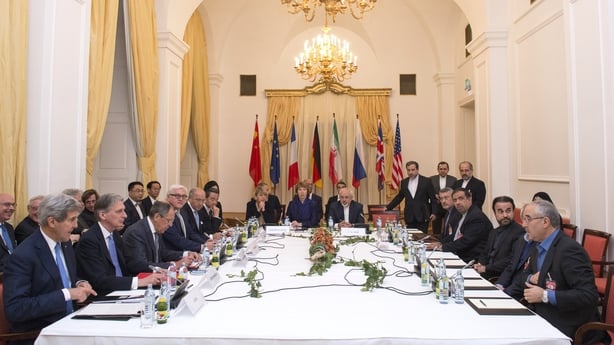Iran and six world powers have failed to resolve their 12-year dispute over its nuclear ambitions for a second time this year.
Iran and the P5+1 have given themselves seven months to overcome the deadlock that has prevented them from clinching an historic deal.
Iranian President Hassan Rouhani said a nuclear deal would be done despite the missed deadline at the talks in Vienna.
"This way of negotiation will reach a final agreement," Mr Rouhani said.
"Most of the gaps have been removed," he said on state television.
He was referring to the main differences that have so far prevented an interim deal being turned into a comprehensive settlement.
Iran and the five permanent members of the UN Security Council plus Germany will now seek to strike an outline deal by 1 March and to secure an agreement on the substance of a final accord by 1 July, officials said.
British Foreign Secretary Philip Hammond told reporters: "We have had to conclude it is not possible to get to an agreement by the deadline that was set for today and, therefore, we will extend the JPOA to 30 June 2015."
He was referring to the Joint Plan of Action, an interim deal agreed between the six countries and Iran a year ago in Geneva.
Under that deal, Iran halted higher level uranium enrichment in exchange for a limited easing of sanctions, including access to some frozen oil revenues abroad.
Mr Hammond said the expectation was that Iran would continue to refrain from sensitive atomic activity.
He said Iran and the powers "made some significant progress" in the latest round of talks, which began last Tuesday in the Austrian capital.
Mr Hammond said there was a clear target to reach a "headline agreement" of substance within the next three months and talks would resume next month.
An Iranian official confirmed the extension, as did Russian foreign minister Sergei Lavrov, who echoed Mr Hammond's comments about "substantial progress".

US Secretary of State John Kerry also spoke to the media in Vienna before returning to the United States.
He echoed the comments of others by noting "real and substantial progress", while also saying he had seen "new ideas" during the talks.
However, he said there are "still some significant points of disagreement" in the talks.
Mr Kerry said the talks "are not going to get easier just because we extend them ... they're going to stay tough".
He also warned that they cannot negotiate with Iran forever without serious progress, but he said now is not the time to walk away.
Pessimism over prospect of agreement being reached
One senior Western diplomat expressed pessimism about the prospects for an agreement in seven months' time.
"It's been ten years that proposals and ideas have been put forward," he said on condition of anonymity.
"There's nothing left. It's essentially a side issue now. The Iranians are not moving. It is a political choice."
"I am sceptical that even if we did extend we will be able to reach a deal," he said, shortly before the extension was announced.
The deadline for a deal, agreed in July when the two sides missed an earlier target date, was today.
The Vienna talks have aimed for a deal that could transform the Middle East, open the door to ending economic sanctions on Iran and start to bring a nation of 76 million people in from the cold after decades of hostility with the West.
The cost of failure could be high and Iran's regional foes Israel and Saudi Arabia are watching nervously.
Both fear a weak deal that fails to curtail Iran's nuclear ambitions, while a collapse of the negotiations would encourage Iran to become a threshold nuclear weapon state, something Israel has said it would never allow.
The main sticking points in the talks are the scope of Iran's enrichment programme, the pace of lifting sanctions that have crippled Iran's economy and the duration of any deal.
Western officials said Iran has refused to budge on its demands to continue to operate most of its enrichment centrifuges currently in operation.
Iran blames the West for the deadlock, accusing it of making excessive demands.

